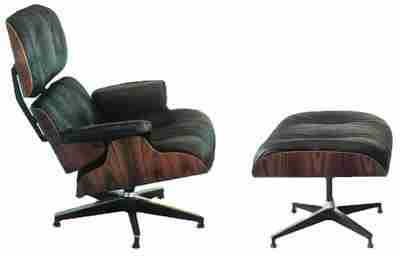|
|

design practice and theory
CLICK THE RED DOTS IN THE LOGO TO OPEN NEW PAGES AT RANDOM |
|
|

design practice and theory
CLICK THE RED DOTS IN THE LOGO TO OPEN NEW PAGES AT RANDOM |
 |
The famous Lounge Chair and Ottoman
of was designed in 1965 by Ray and Charles Eames. These two american designers
worked from the start in 1948 often with bent plywood. They even had at
one moment their own factory.
This chair is probably one of the most comfortable chairs ever made. |
|
| Eames has assigned in this chair a separate component to
every single function, such as a backrest, a seat, a headrest, connecting
joints between parts, the five legged support, etc. This has led to the
assumption that this chair is a typical expression of american functionalism.
The more accurate definition as organic design underlines the flowing form
of the elements. Even more precisely we recognize the application of a
Hamilton curve, a continuous curve around each part. Such a curve divides
the form in two nesting shells.
One halve is the active, bearing, part, the other is the passive, supported, part. A Hamilton curve curve divides for example a tennis ball. Eames has elegantly solved many technical problems in his products such as the flexible joint between plywood and dye cast parts, the zipper connection between the leather skin and the fiberboard back of the different cushions, and the fixing of the upholstery to the plywood shells. |
the Hamilton line | |
| want to know more about the Eameses? look at the following links:
http://abitare.think.it/i/arte/charles.html http://www.eamesoffice.com/ http://www.mancha.demon.co.uk/eames.html |
| look at other easy chairs. |
| back to Modern Classic Chairs |
| Next page is about symbols in design |
| about the modular grid the meaning of colors in Rietvelds chair back to the general analysis of Rietveld's chair |
|
|
|
|
|
|